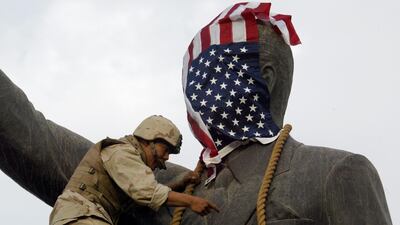To some, it was a defining moment, the end of one era and the dawn of another.
Watching the fall of Saddam Hussein's statue on April 9, 2003, to me, felt illusory. It was hard to believe that the dictator's strongman rule was finally over.
The 15 years that have followed, however, have fallen short of my every expectation.
There has been a failure to build a democratic state in the heart of the Middle East. I felt this was inevitable but I am still disappointed.
I remember the moment before the statue fell, when a US Marine climbed a ladder and covered Saddam's face with an American flag.
That, for me, was the moment Baghdad was taken from us.
It was heartbreaking as it represented the mismanaged invasion that led to my country of birth being torn apart by inter-sectarian and inter-ethnic conflict.
I wanted Iraq to become an inclusive country, a democracy that is at peace with itself and neighbouring states.
The thought of Saddam still haunts many Iraqis. In my view, we are and will always be his terrified hostages — ones that have never been able to coexist peacefully, with or without him.
My family and I left our homeland in 1991 a few months after Gulf War ended.
We did so because the country felt broken.
________________
Beyond the Headlines Podcast: Saddam Hussein's downfall, 15 years on
________________
Parts of the population did not feel represented by the government. They still don't.
Those who suffered under Saddam were braced for more hardship after his removal. They have suffered.
Baghdad is ranked as one of the worst cities in the world for quality of life. Even though the country has the resources it needs to rebuild.
The irony here, is that the bloodshed, looting and destruction that followed the fall of the statue has left many Iraqis with the thought that his rule was a period of relative peace and stability.
A decade and a half later I still hear people saying that "although Saddam is gone, we now have thousands of him around us".
The remark is a mark of how little faith there is in the country's leaders: one big dictator has been replaced by many little ones.
And although the overthrow of Saddam was relatively quick, the war itself was anything but.
I often wonder how will the trauma of an Iraqi orphan affect his or her future relationships? What will the Iraqi community look like in another 15 years? And how can the refugee children who cannot remember their childhood in Iraq and only have memories of extended family, form their identity and history?
I feel this deeply.
Since 2003, US, British and other foreign military personnel have attempted to work with Iraqis to secure and rebuild the country.
After the poor planning and mistrust born of an invasion, however, the eruption of violence should have been predictable.
Overnight, people lost their livelihood on the flimsiest evidence that they were complicit with Saddam. In fact, they had only joined the Baath Party as it was often a condition to get even a menial job in a government department. Having that taken away stoked anger and disenfranchisement.
What followed was even worse.
The failure to find weapons of mass destruction and the horrifying abuse of prisoners at Abu Ghraib had a toxic impact.
Iraqi leaders today insist the country is in the best state it has been since 2003.
But the lack of trust between different sections of society, poor public services and high levels of unemployment remain.
There is no doubt that Iraq is plagued with social and political anarchy, worsened by a second violent insurgency led by ISIL.
Although progress has been made in the building of government institutions, Iraq was ranked 166 out of 176 nations in Transparency International's corruption Index for 2017. That is a dire measure, showing that the system remains weak. A flawed constitution, contrived by the US and Britain, remains a subject of debate.
Many Iraqis argue that over the past decade they have had to endure two occupations, one by the US military and the other by ISIL.
In 2014, ISIL was at the height of its power in Iraq, having taken a third of the country. Although Prime Minister Haider Al Abadi declared victory against the extremists in December after a military campaign lasting more than three years, the battle continues today.
This is only one corner of Iraq's destruction.
Politicians must persuade all citizens that a future does exist. Otherwise, regardless of how many elections are held, resentment will be followed by more of the same bloodshed.
Unfortunately, it is a violent reality we have got used to.


